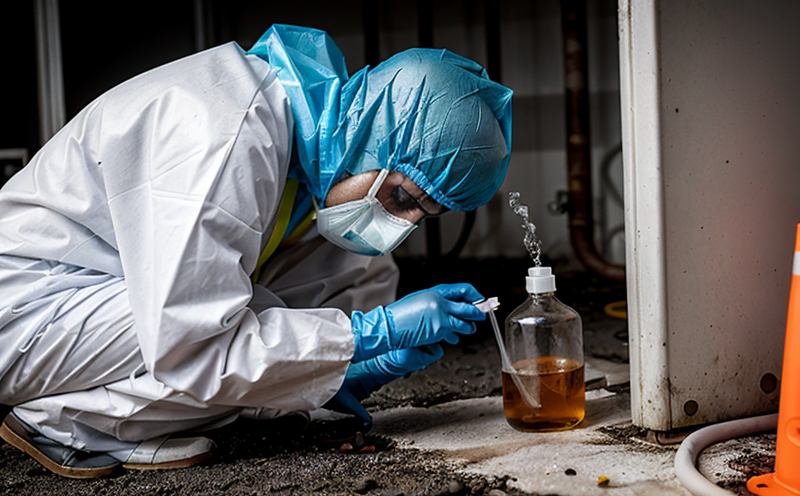ASTM D7647 Chemical Analysis of Polymer Powders by GC-MS
The ASTM D7647 standard is widely recognized in the additive manufacturing and 3D printing sectors for its comprehensive approach to chemical analysis of polymer powders. This method uses Gas Chromatography-Mass Spectrometry (GC-MS) technology, which offers high sensitivity and specificity necessary for detecting trace amounts of contaminants or additives within these materials.
The primary application area of this test is in ensuring the purity and consistency of polymer powders used in additive manufacturing processes. Impurities can significantly affect the mechanical properties, thermal stability, and overall performance of parts produced via 3D printing. By adhering to ASTM D7647, manufacturers can ensure that their raw materials meet stringent quality standards, thereby enhancing product reliability.
The testing process involves several critical steps: sample preparation, dissolution, extraction, derivatization (if necessary), and injection into the GC-MS system. During this procedure, various solvents are used to dissolve the polymer powders, followed by selective extraction of potential contaminants or additives. Subsequently, these extracts undergo derivatization if required for better detection by the mass spectrometer.
GC-MS analysis allows laboratories like Eurolab to identify and quantify even minute traces of compounds present in the polymer samples. This capability is crucial given that many additive manufacturing processes operate at extremely fine scales where small deviations can have significant impacts on final product quality. The precision offered by this analytical technique ensures compliance with industry specifications such as ISO standards for additive manufacturing.
Another important aspect addressed by ASTM D7647 is the need to account for various types of contaminants that might be present in polymer powders, including residual monomers, catalyst residues, and other impurities introduced during processing. These elements can influence both the chemical structure and physical characteristics of the end products, making their presence undesirable unless explicitly intended as part of the formulation.
For instance, some advanced 3D printing techniques require specific additives that improve printability or enhance certain properties like strength or flexibility. However, it's essential to distinguish between these beneficial components and any unintended impurities. Proper identification through rigorous testing helps avoid contamination issues while also ensuring optimal utilization of desired additives.
The results obtained from ASTM D7647 are typically reported in terms of peak areas corresponding to each detected compound along with their respective concentrations or percentages relative to the total sample weight. This quantitative information provides valuable insights into potential sources of variability within batches of polymer powders and aids process optimization efforts aimed at improving consistency across production runs.
In summary, adherence to ASTM D7647 ensures that manufacturers can produce high-quality additive manufacturing parts consistently while meeting stringent regulatory requirements. Through precise chemical analysis facilitated by GC-MS technology, this standard plays a vital role in maintaining product integrity and reliability throughout the supply chain.
Benefits
- Purity Assurance: Ensures that polymer powders are free from unwanted contaminants or additives not intended for use, thus enhancing product quality.
- Process Optimization: Identifies sources of variability within batches, enabling manufacturers to refine their processes and improve consistency.
- Compliance Verification: Meets regulatory requirements set forth by international standards organizations like ASTM.
- Informed Decision-Making: Provides detailed data on the composition of polymer powders, aiding in informed decisions regarding raw material selection and process control.
Eurolab Advantages
At Eurolab, our commitment to excellence extends beyond just performing ASTM D7647 tests; we offer a seamless experience from initial consultation through final report delivery. Our team of highly skilled chemists and technicians ensures that every step of the testing process adheres strictly to established protocols, guaranteeing accurate results.
We utilize state-of-the-art GC-MS equipment capable of detecting extremely low concentrations of compounds, providing reliable data even when dealing with minute amounts of sample material. This precision is particularly important in additive manufacturing where small differences can have substantial effects on final product characteristics.
In addition to technical expertise and advanced instrumentation, Eurolab prides itself on offering personalized service tailored to the needs of our clients. Whether you are a quality manager looking to verify batch consistency or an R&D engineer seeking detailed compositional information for material development projects, we provide comprehensive support throughout your testing journey.
Our laboratories are accredited according to international standards such as ISO/IEC 17025:2017, ensuring that all our practices meet the highest quality assurance criteria. This accreditation is a testament to our unwavering dedication to maintaining accuracy and reliability in every test conducted here.
In conclusion, choosing Eurolab for your ASTM D7647 chemical analysis needs means partnering with a trusted expert committed to delivering precise results consistently across all projects. With our commitment to innovation, precision, and customer satisfaction, we are confident that you will find working with us both efficient and rewarding.
International Acceptance and Recognition
The ASTM D7647 standard enjoys widespread recognition within the global additive manufacturing community due to its robust approach towards chemical analysis of polymer powders. Recognized by major industry players around the world, this test serves as a benchmark for ensuring product quality in compliance with international standards.
Many leading manufacturers and suppliers rely on ASTM D7647 results when certifying their materials for use in additive manufacturing processes. Its acceptance extends not only to North American markets but also covers Europe, Asia-Pacific regions, and beyond. Compliance with this standard is often seen as an assurance of product reliability and safety across borders.
Moreover, the stringent criteria set forth by ASTM D7647 help reduce risks associated with using potentially harmful or substandard raw materials in additive manufacturing applications. By mandating thorough chemical profiling prior to commercialization, it contributes significantly towards fostering trust among stakeholders involved at every stage of production - from supplier to end user.
As a result, adherence to ASTM D7647 has become increasingly important for companies operating internationally or those seeking certification under recognized quality management systems. It not only enhances reputation but also facilitates smoother business operations by aligning with global best practices in materials testing and evaluation.





